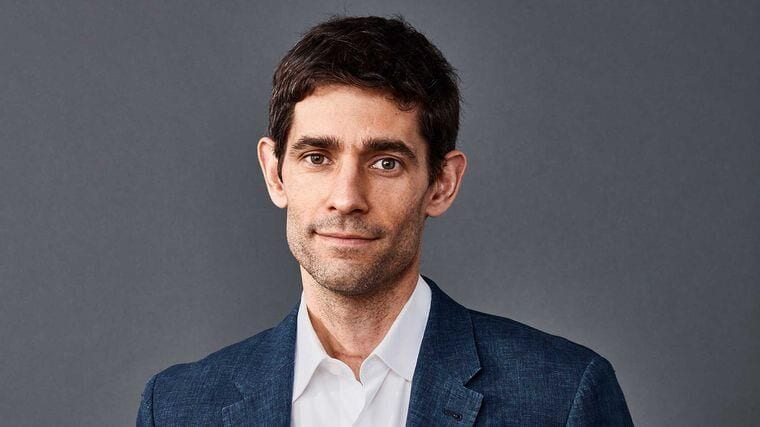An Interview with Nick Thompson, Editor-in-Chief, Wired
Jana Pijak — May 21, 2018 — Business
Sitting down with Trend Hunter’s CEO Jeremy Gutsche at Future Festival New York 2018, Wired’s Editor in Chief Nick Thompson talks about the importance of evolving educational and news content in order to align with the speed at which our world is changing.
1. Why is it important to study the future?
It's important to study the future because humankind is changing, probably faster than ever before. We have to understand how we're changing so we can make good decisions right now, foundational decisions that will determine what the world is like, what kind of jobs people will have, the way they will communicate, the way they'll think, the way they'll interact with machines.
The choices that we make now are going to have a profound influence on that future. We may not know what those choices are, but the more we study the future, the more we think about it, the better the choices we make.
If you think about five years from now, you think about the consequences of choices you’re making now. You may end up making better choices because societies can be turned upside down. The world our children are going to live in will be so different from the world we live in and we don't know exactly how – nobody knows exactly how. And you can throw up your hands and say, I don't know, let's just proceed as we're proceeding, or you can say, wait a second, let's think about the possible future. Let's think about the choices that we make now that could determine whether there'll be good or bad or at least try to make better choices. And maybe we'll pick the wrong things or maybe something none of us created will happen. I do think that if we study this future, we'll make better choices and will lead to better outcomes.
2. Do our leaders of companies and governments have a grasp on things?
I think that there are a lot of leaders who have a really good grasp on things. I think there are a lot of people who are thinking seriously. I think there are companies that are taking big, complex questions about the future very seriously. And then I think there are people in positions of power who aren't thinking at all, whether that’s because they're a politician who has other priorities and just doesn't care and is only thinking about the next re-election cycle or a company that's just thinking about earnings.
3. Are we on a dependent path where what's going to happen is going to happen, or are there ways to impact our future?
Every single thing we do changes what the future will be. I really do believe kind of more in a butterfly effect than I do in an independent path. I think there probably are things that have changed in the last six months in the way that Facebook operates, in the way that Google operates, and the way the whole world thinks about privacy that have totally changed the way technology develops in the future. Some for better, some worse.
4. If I'm a Wired reader, what are some of the things that I should do to alter my path or the right destination?
I think one of the most important things that we're going to have to figure out in the future is how we regulate and think about artificial intelligence. Should we have government mandates for transparency and for understanding algorithms? Should we just make sure that the people who are building the algorithms that will determine how developers are well trained in all kinds of different areas, not just in computer science, but also in the arts and literature.
Should we make sure that somehow Western values of democracy, free speech are closely held by people who are building artificial intelligence? Or does that not matter at all? And those are interesting choices, and I think they'll have a profound effect on the technology that will shape our lives 20 years from today.
5. Is there a worry about the fact that technology, literacy and leadership have traditionally been two very different things?
I worry a lot that the politicians in the United States particularly, don't know enough about technology, don't care enough about technology. We saw this when Mark Zuckerberg testified in front of Congress where some of the questions were good, and others were embarrassingly bad. You know, for people who clearly hadn't been thinking at a deep level and that's on us as journalists. We should have done a better job of educating the public.
But it's also on our political leaders who should do a better job of trying to study this, tto understand tech and to try to understand the future.
6. That brings us back to your kids. What do you think of when you think of your three kids in the future?
In the present moment with my three children, I think about how to introduce them to technology in a way that gets them excited, that makes them think about careers in technology, or at least careers where they have a positive relationship with technology. But I also don't want them to get sucked in or manipulated or become addicted. There are a lot of risks with technology, particularly social media today.
So how you introduce your kids to tech is important. They're asking about the makers, about learning how to code, about what virtual reality can be without seeing the dark side, why that's important. And then, you know, how do you guarantee that they'll have jobs and be able to live their own life in three years? I have no idea.
But I do think that making sure they're passionate about stuff or helping them be passionate about stuff and helping them do things that spark creativity is necessary no matter how the future evolves.
7. Using the Raspberry Pi example, do you think about the difference between your kids being technologically literate and well-adjusted?
So I have a fun story about my oldest child and we had to build a Raspberry Pi. I actually got the Wired office a Raspberry Pi as a little computer that you put together. And it may sound like a huge technological accomplishment, but it's not right. It's just like a yellow cake you plug into the right thing. Eventually you get a computer, which shows how simple and cool computers are.
I told him if he does one, he can use it. So my older son builds it and we work on it together. And then he has access to the web connected to the iPhone, he goes on to Google. He starts searching for me and I let him be. I don't look at it while he's searching Google. The next day I'm going to go to the search logs to see what does a child do the first time they're on for the first time and now that they have access to all the world's information.
I was a little scared. Thank god, I looked and I saw Tesla versus Honda, how to get parents to buy a Tesla, who is Elon Musk? It was all about electric cars and vehicles and basically trying to get us to get rid of our Honda Odyssey.
8. In a different vein. How do you reset yourself to be creative?
The way my personal schedule works is that I work very hard all day and I pretty much work part time. I finish dinner and I go to sleep and that's hard. You get a lot done, but you can get into ruts. And so I think it's very important to run to work and I run to work.
So I have moments where I'm resetting. I wake up with my kids, I run to work and I kind of think through things and I'm at work and I go home with my kids continuously and I run in between that time. So the way it works, I get up with my kids and I drop them off at school and I run to work.
And that's a moment where I reset and think through things. Then I go to work a pretty intense day and then I run home. So there's a moment where I'm relaxing again, but my kids were obviously going to go back to work, so that's the way I try to do it.
9. How do you tactically ensure a culture of innovation?
At Wired, it's pretty easy to have a culture of innovation since we’re covering innovation. So everybody is thinking about innovation. Everybody's kind of spurred on just by the subject matter, right? That's one of the great things about being acquired, is that because you're covering people, building things, you're always thinking about building things. You also just try to make sure that you have opportunities.
Somebody has a good idea and you help foster it. You create groups and brainstorming and say, what are the craziest things we can do in the next year? And then you try to make sure that the best ideas actually happen, that they at least move forward. Because it's interesting to think that through and you bring in new people.
You don't want to have the same group of people talking about what Wired is so you add people to that
10. Now a lot of your readers and the people that listen to the crowd might not all be a company like Wired. It might be more like, let's say, the New Yorker, your past role. So what are some of the ways to make a culture of innovation happen? When you were at the New Yorker?
Oh, that's tricky. You know, when I worked at The New Yorker, it was a moment of profound change where the magazine was going from a relatively new and narrow product, but out of print magazines, that was amazing. And trying to figure out how to turn it into something much broader where you not only had a magazine, but you had a website, you had social media feeds and you had apps and trying to do all that without killing any amazing print product.
And so the real challenge of The New Yorker was both to get people who had built this amazing print publication to be excited about the digital future. And yet the people who are coming in to build the digital future, understand the amazing DNA of the print products. And that worked and the reason it worked is we really hired people onto the website who understood the print side.
We had to set up some incentives to make sure everybody could work together and made sure everybody sat together. We had lots of meetings together to talk about issues and concerns, but ultimately it all gelled and there was very little backsliding, and very few people who weren't excited about what was happening.
11. What are you most proud of?
The thing that I’m most proud of is that when I look back on my career in a couple of years, I’ll know that I helped Wired reinvent itself at a moment of change and crazy transition, where the legs are being cut from all kinds of media organizations.
1. Why is it important to study the future?
It's important to study the future because humankind is changing, probably faster than ever before. We have to understand how we're changing so we can make good decisions right now, foundational decisions that will determine what the world is like, what kind of jobs people will have, the way they will communicate, the way they'll think, the way they'll interact with machines.
The choices that we make now are going to have a profound influence on that future. We may not know what those choices are, but the more we study the future, the more we think about it, the better the choices we make.
If you think about five years from now, you think about the consequences of choices you’re making now. You may end up making better choices because societies can be turned upside down. The world our children are going to live in will be so different from the world we live in and we don't know exactly how – nobody knows exactly how. And you can throw up your hands and say, I don't know, let's just proceed as we're proceeding, or you can say, wait a second, let's think about the possible future. Let's think about the choices that we make now that could determine whether there'll be good or bad or at least try to make better choices. And maybe we'll pick the wrong things or maybe something none of us created will happen. I do think that if we study this future, we'll make better choices and will lead to better outcomes.
2. Do our leaders of companies and governments have a grasp on things?
I think that there are a lot of leaders who have a really good grasp on things. I think there are a lot of people who are thinking seriously. I think there are companies that are taking big, complex questions about the future very seriously. And then I think there are people in positions of power who aren't thinking at all, whether that’s because they're a politician who has other priorities and just doesn't care and is only thinking about the next re-election cycle or a company that's just thinking about earnings.
3. Are we on a dependent path where what's going to happen is going to happen, or are there ways to impact our future?
Every single thing we do changes what the future will be. I really do believe kind of more in a butterfly effect than I do in an independent path. I think there probably are things that have changed in the last six months in the way that Facebook operates, in the way that Google operates, and the way the whole world thinks about privacy that have totally changed the way technology develops in the future. Some for better, some worse.
4. If I'm a Wired reader, what are some of the things that I should do to alter my path or the right destination?
I think one of the most important things that we're going to have to figure out in the future is how we regulate and think about artificial intelligence. Should we have government mandates for transparency and for understanding algorithms? Should we just make sure that the people who are building the algorithms that will determine how developers are well trained in all kinds of different areas, not just in computer science, but also in the arts and literature.
Should we make sure that somehow Western values of democracy, free speech are closely held by people who are building artificial intelligence? Or does that not matter at all? And those are interesting choices, and I think they'll have a profound effect on the technology that will shape our lives 20 years from today.
5. Is there a worry about the fact that technology, literacy and leadership have traditionally been two very different things?
I worry a lot that the politicians in the United States particularly, don't know enough about technology, don't care enough about technology. We saw this when Mark Zuckerberg testified in front of Congress where some of the questions were good, and others were embarrassingly bad. You know, for people who clearly hadn't been thinking at a deep level and that's on us as journalists. We should have done a better job of educating the public.
But it's also on our political leaders who should do a better job of trying to study this, tto understand tech and to try to understand the future.
6. That brings us back to your kids. What do you think of when you think of your three kids in the future?
In the present moment with my three children, I think about how to introduce them to technology in a way that gets them excited, that makes them think about careers in technology, or at least careers where they have a positive relationship with technology. But I also don't want them to get sucked in or manipulated or become addicted. There are a lot of risks with technology, particularly social media today.
So how you introduce your kids to tech is important. They're asking about the makers, about learning how to code, about what virtual reality can be without seeing the dark side, why that's important. And then, you know, how do you guarantee that they'll have jobs and be able to live their own life in three years? I have no idea.
But I do think that making sure they're passionate about stuff or helping them be passionate about stuff and helping them do things that spark creativity is necessary no matter how the future evolves.
7. Using the Raspberry Pi example, do you think about the difference between your kids being technologically literate and well-adjusted?
So I have a fun story about my oldest child and we had to build a Raspberry Pi. I actually got the Wired office a Raspberry Pi as a little computer that you put together. And it may sound like a huge technological accomplishment, but it's not right. It's just like a yellow cake you plug into the right thing. Eventually you get a computer, which shows how simple and cool computers are.
I told him if he does one, he can use it. So my older son builds it and we work on it together. And then he has access to the web connected to the iPhone, he goes on to Google. He starts searching for me and I let him be. I don't look at it while he's searching Google. The next day I'm going to go to the search logs to see what does a child do the first time they're on for the first time and now that they have access to all the world's information.
I was a little scared. Thank god, I looked and I saw Tesla versus Honda, how to get parents to buy a Tesla, who is Elon Musk? It was all about electric cars and vehicles and basically trying to get us to get rid of our Honda Odyssey.
8. In a different vein. How do you reset yourself to be creative?
The way my personal schedule works is that I work very hard all day and I pretty much work part time. I finish dinner and I go to sleep and that's hard. You get a lot done, but you can get into ruts. And so I think it's very important to run to work and I run to work.
So I have moments where I'm resetting. I wake up with my kids, I run to work and I kind of think through things and I'm at work and I go home with my kids continuously and I run in between that time. So the way it works, I get up with my kids and I drop them off at school and I run to work.
And that's a moment where I reset and think through things. Then I go to work a pretty intense day and then I run home. So there's a moment where I'm relaxing again, but my kids were obviously going to go back to work, so that's the way I try to do it.
9. How do you tactically ensure a culture of innovation?
At Wired, it's pretty easy to have a culture of innovation since we’re covering innovation. So everybody is thinking about innovation. Everybody's kind of spurred on just by the subject matter, right? That's one of the great things about being acquired, is that because you're covering people, building things, you're always thinking about building things. You also just try to make sure that you have opportunities.
Somebody has a good idea and you help foster it. You create groups and brainstorming and say, what are the craziest things we can do in the next year? And then you try to make sure that the best ideas actually happen, that they at least move forward. Because it's interesting to think that through and you bring in new people.
You don't want to have the same group of people talking about what Wired is so you add people to that
10. Now a lot of your readers and the people that listen to the crowd might not all be a company like Wired. It might be more like, let's say, the New Yorker, your past role. So what are some of the ways to make a culture of innovation happen? When you were at the New Yorker?
Oh, that's tricky. You know, when I worked at The New Yorker, it was a moment of profound change where the magazine was going from a relatively new and narrow product, but out of print magazines, that was amazing. And trying to figure out how to turn it into something much broader where you not only had a magazine, but you had a website, you had social media feeds and you had apps and trying to do all that without killing any amazing print product.
And so the real challenge of The New Yorker was both to get people who had built this amazing print publication to be excited about the digital future. And yet the people who are coming in to build the digital future, understand the amazing DNA of the print products. And that worked and the reason it worked is we really hired people onto the website who understood the print side.
We had to set up some incentives to make sure everybody could work together and made sure everybody sat together. We had lots of meetings together to talk about issues and concerns, but ultimately it all gelled and there was very little backsliding, and very few people who weren't excited about what was happening.
11. What are you most proud of?
The thing that I’m most proud of is that when I look back on my career in a couple of years, I’ll know that I helped Wired reinvent itself at a moment of change and crazy transition, where the legs are being cut from all kinds of media organizations.
0.4
Score
Popularity
Activity
Freshness






















